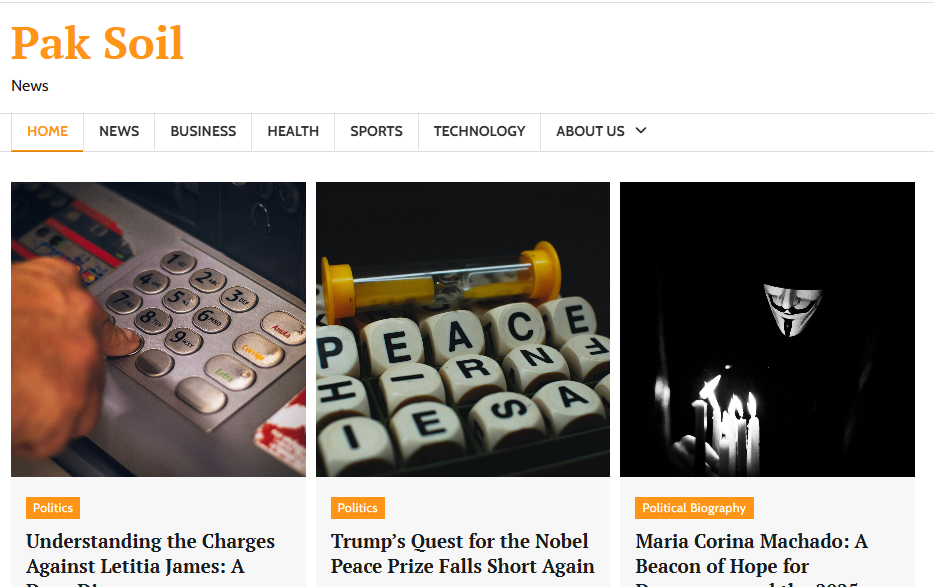Introduction
In the ever-evolving digital landscape, domain names are more than just addresses on the web—they are valuable assets that hold immense potential for businesses, investors, and brands. One such remarkable case is the domain “PakSoil,” which has skyrocketed in value from $1 million to a staggering $10 million. This meteoric rise in valuation not only underscores the increasing demand for premium domain names but also highlights the strategic importance of owning the right digital property. In this blog post, we’ll dive deep into the factors contributing to the extraordinary growth of PakSoil’s domain value and explore why it is now considered one of the most valuable digital assets.
The Journey of PakSoil: From $1 Million to $10 Million
When PakSoil was initially valued at $1 million, it was already regarded as a highly attractive domain. The name alone carries immense potential, representing Pakistan’s soil— a resource crucial to agriculture, the country’s economy, and sustainable development. However, what made the domain even more special was its alignment with current trends in global agriculture, environmentalism, and national pride.
But in just a few years, PakSoil’s value exploded to $10 million. What exactly fueled this impressive surge?
1. **Political Influence on Domain Valuation**
National Stability and Governance
A domain like PakSoil.com, directly referencing the soil and agriculture of Pakistan, can be highly sensitive to the political environment. Political stability and the government’s policies towards agriculture, sustainability, and environmental conservation can directly influence the demand for such a domain. For instance:
Agricultural Policies: A government focused on improving agricultural production or soil health, especially in the context of climate change, could lead to an increased demand for domains like PakSoil. If Pakistan’s government passes new agricultural reforms or invests in eco-friendly farming technology, the demand for digital resources related to these topics would spike. This in turn would increase the domain’s value.
Foreign Relations: Pakistan’s relationships with its neighboring countries (like India, China, Afghanistan, and Iran) can also affect the domain’s strategic value. A domain like PakSoil could serve as a platform for cross-border agricultural projects, international trade in soil or agricultural products, or even environmental diplomacy. Strong international ties often drive up domain values due to potential market expansion.
Regulatory Environment: Laws and regulations around soil use, agricultural production, or environmental protection will also have an impact. For example, if the Pakistani government introduces stricter regulations on agricultural practices to preserve soil or combat desertification, the domain could become a hub for advocacy, research, and solutions in these areas.
Public and Private Sector Collaboration
In many countries, the political environment dictates whether public-private partnerships thrive. In Pakistan, for example, state-run projects related to agriculture and soil conservation could be launched in collaboration with private enterprises. A domain like PakSoil could be a strategic tool for these collaborations, acting as a digital platform for government and private sector entities working on agricultural sustainability.
2. Impact of Wartime Situations
Economic Disruption and Demand for Agribusiness
During times of war or political instability, agricultural production can be severely impacted. In such scenarios, domains like PakSoil could serve as vital communication tools for rebuilding efforts. Soil conservation, agricultural revitalization, and food security become even more pressing concerns during wartime.
Post-Conflict Recovery: After a conflict, one of the most urgent areas of reconstruction is often the agricultural sector, particularly soil restoration and ensuring food security. In the event of an agricultural crisis, the domain could be used to disseminate information about soil regeneration, farming techniques, and resources to help farmers recover. This would raise the domain’s value significantly in post-war recovery.
Refugee Crises and Agricultural Needs: Wars often result in large refugee populations who need to be fed and resettled. Countries like Pakistan, which are situated in volatile regions, often face the challenge of accommodating refugees. During such times, agricultural domains can be used to educate displaced populations on soil fertility, sustainable farming practices, and other essential agricultural skills to foster self-sufficiency.
Humanitarian Aid Platforms: During wartime, international NGOs and government organizations often work together to provide humanitarian aid. A domain like PakSoil could serve as a central hub for information about soil-based aid, agricultural supplies, or farming techniques tailored to regions affected by war or drought.
Military Operations and Resource Control
In some cases, geopolitical tensions or wartime situations can increase the strategic importance of natural resources, including soil and agricultural land. Countries involved in conflicts might also have interests in controlling fertile land and water sources for military or economic leverage.
Strategic Land Use: If Pakistan were involved in a conflict where control over fertile land or agricultural resources was crucial, domains related to agriculture—like PakSoil—could serve as important platforms for disseminating critical information, organizing agricultural efforts, and mobilizing support for land reclamation or protection.
3. **Geopolitical and International Considerations**
Environmental Diplomacy
Given Pakistan’s vulnerability to climate change, soil degradation, and natural disasters like floods and droughts, international relations and geopolitical strategies involving environmental diplomacy can elevate the importance of a domain like PakSoil. The domain could be used to promote Pakistan’s stance on soil health in international conferences, climate change summits, and agricultural policy discussions.
* **Climate Change and Cross-Border Collaboration**: Climate change is a global challenge, and Pakistan, like many other countries, is increasingly affected by issues such as soil erosion, desertification, and water scarcity. In this context, PakSoil could become a platform for cross-border environmental collaborations, where regional governments, NGOs, and international bodies work together to protect soil resources and combat climate-related challenges.
* **Sustainable Agriculture Initiatives**: Pakistan is a member of several international organizations, including the United Nations (UN) and the South Asian Association for Regional Cooperation (SAARC), that promote sustainable agricultural practices. The PakSoil domain could serve as a valuable tool for these organizations to share research, strategies, and best practices on soil preservation, especially within the context of South Asia, where agriculture is a vital sector.
China-Pakistan Economic Corridor (CPEC)
The ongoing China-Pakistan Economic Corridor (CPEC) project is a perfect example of how geopolitics can influence domain values. CPEC is one of the largest infrastructure projects ever undertaken by Pakistan, focusing on improving connectivity and trade routes between China, Pakistan, and beyond. A domain like PakSoil could serve as an essential tool in the development of agricultural initiatives along the CPEC route.
Trade and Export Potential**: As the CPEC project expands, Pakistan could become a significant exporter of agricultural products, including those linked to soil and sustainable farming practices. PakSoil could act as an anchor for e-commerce platforms or agricultural trade hubs, linking Pakistani farmers with international markets.
* **Belt and Road Initiative (BRI)**: The Chinese Belt and Road Initiative (BRI) aims to improve connectivity between China and Pakistan, and through this initiative, there may be opportunities for Pakistan to strengthen its agricultural export potential. In such scenarios, PakSoil can become a digital gateway to promote sustainable farming practices and soil preservation along major trade routes.
4. **War and Economic Sanctions**
In times of war or economic sanctions, a country’s ability to trade and access resources may be compromised. During such periods, securing a domain like PakSoil becomes more valuable as it can help local industries remain connected to international markets, offer e-commerce platforms, and provide vital agricultural insights. For instance:
* **Alternative Markets**: If Pakistan faces economic sanctions that restrict agricultural exports, a platform like PakSoil could serve as a digital solution to connect local farmers with alternative markets or cooperative initiatives.
* **Reconstruction Efforts**: In the aftermath of wartime devastation, countries need to rebuild their agricultural industries. A domain like PakSoil could be utilized by governments or NGOs to provide resources, educational material, and funding opportunities to help restore soil health and food security.
1. **Rising Demand for Agricultural Innovation**
Agriculture has always been a central pillar of Pakistan’s economy, but with the global emphasis on sustainable farming, organic agriculture, and soil preservation, the need for digital platforms focusing on soil health and agricultural technologies has never been greater. PakSoil is perfectly positioned to cater to this demand, especially as emerging technologies continue to reshape how the world thinks about soil and agriculture.
The domain name has immense potential for businesses, NGOs, or government entities focusing on agricultural research, environmental advocacy, or green technologies.
2. **SEO-Optimized Domain for Agriculture and Sustainability**
The value of any domain name is closely linked to its search engine optimization (SEO) potential. A domain name like PakSoil inherently contains keywords that are highly relevant to industries such as agriculture, soil conservation, and environmental sustainability.
For instance, a website built on “PakSoil” can easily rank for terms like:
* “Soil conservation in Pakistan”
* “Agricultural sustainability in Pakistan”
* “Pakistani soil health solutions”
* “Soil testing in Pakistan”
These are high-traffic keywords that businesses within the agricultural space can leverage to drive organic traffic. This built-in SEO advantage significantly enhances the domain’s value.
3. **International Appeal and Recognition**
PakSoil doesn’t just cater to a regional market. The word “Pak” is universally recognized, evoking an international connection to Pakistan, which opens doors for global businesses looking to enter the South Asian market. The combination of the word “Pak” (signifying Pakistan) with “Soil” (a universally understood term related to agriculture) makes the domain internationally appealing. This broadens the scope for potential buyers and increases its valuation.
4. **Brandability and Memorability**
A domain name’s ability to be easily remembered and recognized plays a crucial role in its value. PakSoil is a short, catchy, and easy-to-remember name—qualities that are highly desirable for branding purposes. Businesses in agriculture, environmentalism, and sustainability could see immense brand-building potential in using this domain name, as it succinctly communicates their mission while resonating with local and international audiences.
5. **Government and NGO Potential**
As climate change, food security, and sustainable farming become increasingly important global issues, governments and NGOs across the world are investing heavily in these areas. PakSoil’s domain could serve as a digital platform for governmental projects, environmental campaigns, or international partnerships aimed at improving soil health and agricultural practices in Pakistan and beyond.
Why the $10 Million Valuation is Just the Beginning
The $10 million valuation of PakSoil is not just a reflection of its current market value—it’s an indicator of the growing interest in premium domain names. As more industries realize the value of having a strong, SEO-friendly online presence, the demand for memorable and highly relevant domain names will only increase. Here’s why PakSoil could continue to rise in value:
1. **The Surge in Agricultural Investment**
As the global population grows and the demand for sustainable agriculture intensifies, investments in agritech and soil health are predicted to soar. Pakistan is strategically positioned to benefit from these investments, and a domain like PakSoil can be the perfect digital tool for companies looking to tap into this booming sector.
2. **Increase in Online Presence for Agri-Businesses**
Agriculture is becoming increasingly digitized, with soil health monitoring, farming technologies, and digital marketplaces gaining popularity. As more businesses enter the online space, the need for strong, memorable domains will only increase. PakSoil is perfectly positioned to meet this need, making it a valuable asset for years to come.
3. **Sustainability and Climate Change Focus**
With sustainability and climate change increasingly becoming top global priorities, domains related to environmental impact, agriculture, and sustainability will continue to grow in value. PakSoil is an ideal domain for businesses or organizations focused on addressing these critical issues, providing both a powerful name and SEO advantage.
How Can You Leverage a Domain Like PakSoil?
If you’re an investor, entrepreneur, or business owner in the agriculture, sustainability, or environmental sectors, owning a domain like PakSoil offers several opportunities:
1. **Build a Global Brand**: Use the domain to create a global brand focused on sustainable farming practices, soil health, or agriculture in Pakistan and the surrounding region.
2. **Develop an E-commerce Platform**: Create an online store that sells soil health products, fertilizers, or even agricultural technology tools.
3. **Launch an Educational Platform**: Develop a website that educates people about the importance of soil conservation, agricultural best practices, and sustainable farming techniques.
4. **Government and NGO Partnerships**: Collaborate with government agencies, non-profit organizations, and international bodies to promote soil health and environmental initiatives.
Conclusion
The political, wartime, and geopolitical dynamics surrounding a domain like **PakSoil** highlight just how interconnected the value of digital assets can be with real-world events. Political shifts, wars, international relations, and environmental concerns all play a role in determining the relevance and value of a domain. PakSoil, as a name connected to the crucial resource of soil in Pakistan, could potentially become an influential platform for promoting agricultural practices, sustainability, and international cooperation—especially during times of crisis or change. Thus, political and global events not only shape the digital landscape but also the economic, environmental, and agricultural realities surrounding them.
The remarkable growth in the value of the PakSoil domain from $1 million to $10 million is a testament to the power of premium domain names. With its SEO advantages, agricultural relevance, international appeal, and strong brandability, PakSoil represents a tremendous opportunity for the right buyer. Whether you are looking to create a brand that resonates with people, tap into a rapidly growing market, or secure a digital asset with exceptional future potential, PakSoil is a domain that should not be overlooked.
As digital real estate continues to gain in value, domain names like PakSoil are becoming invaluable assets that offer long-term benefits. If you’re fortunate enough to own or acquire a domain of this caliber, the possibilities are endless.
Interested in learning more about premium domains and how they can transform your business? Contact us today to explore opportunities with high-value domains like PakSoil.
About TodayResearcher
At TodayResearcher, we bring you stories that matter. Covering everything from breaking news and world events to lifestyle, entertainment, science, and culture, our editorial team is dedicated to delivering accurate, insightful, and engaging content. We aim to keep readers informed, inspired, and curious about the world around them.



